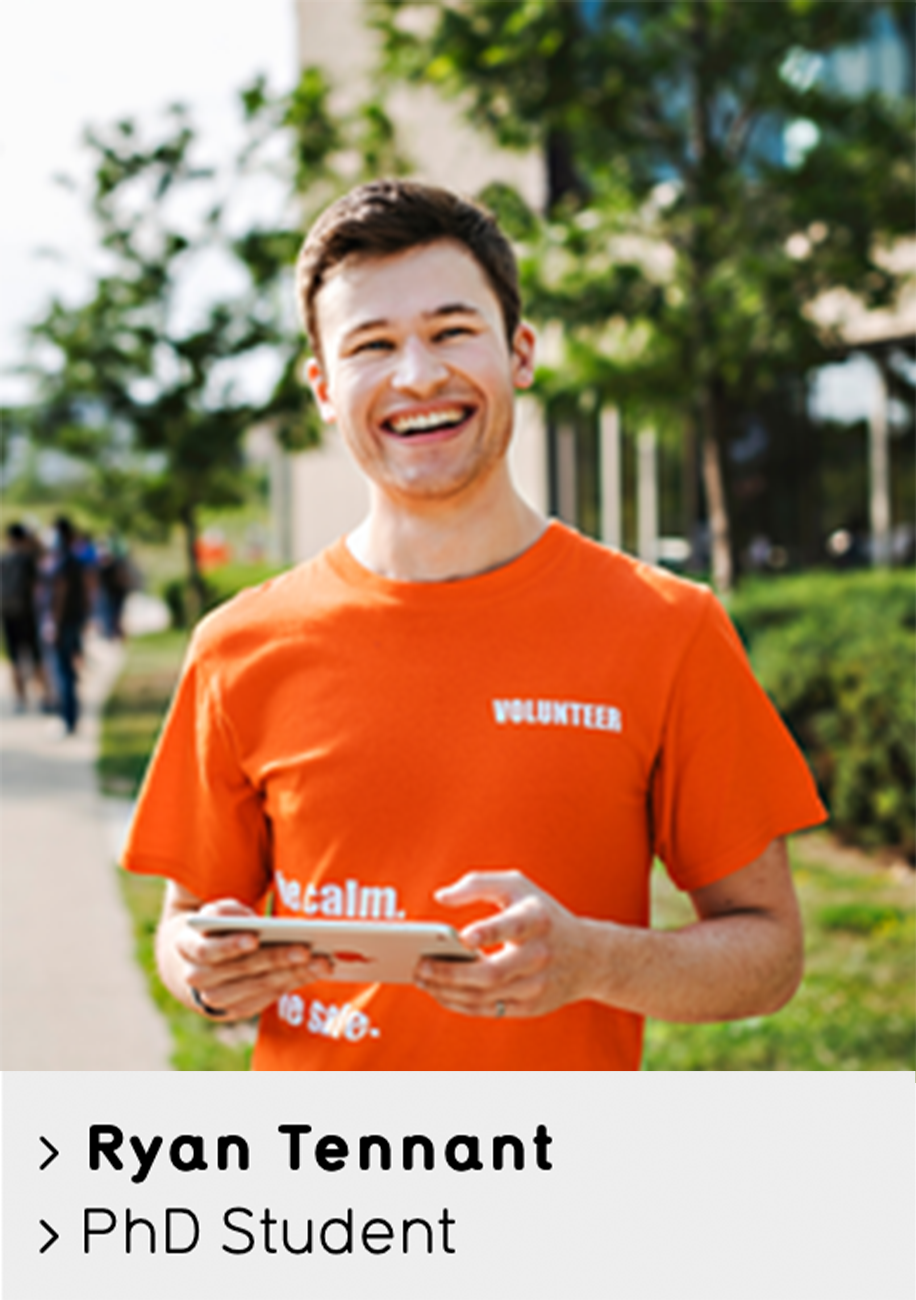Ryan Tennant is intere

Even
so, Tennant didn’t
expect
that, less
than
a year
into
his
PhD,
he’d be
launching
an
app
for staff in COVID-19
vaccine
clinics. In July,
he began
pilot
testing
the app at
the
Health
Sciences
Campus
(HSC) Clinic,
a
regional
vaccination
clinic
led
by
the
Centre
for
Family
Medicine
and
hosted
in
the
University
of
Waterloo’s
School
of
Pharmacy.
A BASc
in
Biomedical
Engineering and
a
MASc in Systems
Design
Engineering,
both
at
Waterloo, Tennant studies human
factors
engineering,
a
branch
of
the
discipline
that
examines
how
tools,
machines
and
systems
are
designed
to
reflect
the
capabilities
and
limitations
of
their
users.
“Given my background, my co-supervisor professor Catherine Burns and I met with pharmacy professor Kelly Grindrod and Moses Tetui, her post-doc researcher,” says Tennant. “The clinic had just opened, and Kelly described some of the workflow challenges involved. I quickly saw that a human factors perspective could help support the vaccine roll-out in the region.”
The HSC Clinic gives the Pfizer-BioNTech COVID-19 vaccine, meaning it has a complex workflow due to the vaccine’s temperature and dilution requirements. Combine this with the ever-evolving guidelines around who is eligible for a vaccine, where vaccines are available and whether walk-in appointments are supported, anddesigning the most efficient clinic becomes more challenging.
“In some ways, running a clinic is like a math problem that you’re doing over and over again because your inputs keep changing,” Tennant says. “Talking to the staff and observing their tasks, I learned about several variables that can influence the final output of the equation.”
The biggest challenge Tennant observed was the potential for wasted vaccine. Once a vial of the Pfizer vaccine is punctured, it must be used within a six-hour window. While considering several variables, the clinic team makes critical decisions about opening extra vials. To make decisions, the staff must track and communicate information across multiple teams, including the volunteers and check-in staff who coordinate patient flow, the security staff tracking walk-ins, the pharmacy team that prepares the vaccines for use and the vaccination team that gets doses into arms.
Efficient and effective communication is critical to manage end-of-day dose decisions, and Tennant was determined to provide a solution.
“They needed a digital tool that could be shared and updated in real time across all teams,” he says. “Something that puts all staff on the same page with respect to the numbers, automates their calculations and supports human situational awareness to help predict their end-of-day doses.”
After observing regional clinics and speaking with clinic staff, Tennant went to work coding. A week later, he had a prototype app to present to the team at the HSC Clinic. Since then, he’s submitted ethics amendments, gathered feedback from the many partners involved in the clinic and rolled out updates to improve usability.
The app is now in beta testing at the HSC Clinic and was recently piloted at the large Every Dose Counts vaccination drive.
“It’s a really simple app, but the reception has been overwhelmingly positive,” he says. “The app was designed to help alleviate the stress of end-of-day doses – to ensure that there are fewer or no doses that go unused.”
Tennant continues to improve the app and integrate new features that support clinic workflow. He is also working with the Region and other partners to explore rolling it out in other locations where it may be useful. The goal is to also design a tool that is adaptable and may be of use in future vaccine rollouts.
“Working in partnership with the amazing nurses, pharmacists, clinic staff and volunteers has been an eye-opening experience,” says Tennant, who also volunteers at the HSC Clinic with his family. “I wouldn’t have been able to build this without their support and willingness to let me observe the ups and downs of their day.”
The research project was developed in partnership with the Region and its vaccine clinics and with team members from the University of Waterloo, Grand River Hospital, and St. Mary’s Hospital.
Running a vaccine clinic? There’s an app for that was originally posted in Waterloo News.